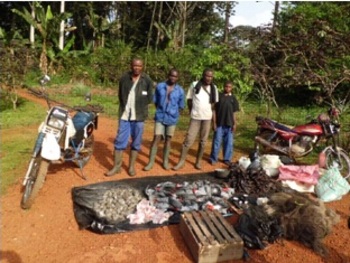 The face of the Illigal trade in African grey parrots and partsA notorious parrot trapper, Roger Atangana, and three of his accomplices, have once again been arrested. Atangana was caught with 113 parrot heads, 43 death parrots, 85 smoked parrots, 13 live parrots and 1650 tails inside Lobéké National Park, in the East Region of Cameroon. Two motorbikes were also seized from the capturers.
The face of the Illigal trade in African grey parrots and partsA notorious parrot trapper, Roger Atangana, and three of his accomplices, have once again been arrested. Atangana was caught with 113 parrot heads, 43 death parrots, 85 smoked parrots, 13 live parrots and 1650 tails inside Lobéké National Park, in the East Region of Cameroon. Two motorbikes were also seized from the capturers.
Atangana was arrested on March 21, by game rangers and elements of Cameroon’s Rapid Intervention Brigade, known in French as BIR. The World Wide Fund for Nature, WWF provided financial and logistics support for the anti-poaching operation.
This is the sixth time Atangana and co have been arrested inside Lobéké, illegally capturing and decapitating the African grey parrots. The poacher has been condemned five times to mild prison terms ranging between 25 days to 6 months.
In 2008 gendarmes arrested Atangana for threatening the life of game rangers with a grenade. He was slammed 5 months jail term by a military tribunal in Yaoundé. But he returned to the park in March 2011, and was again arrested and sentenced to 25 days in prison and ordered to pay a fine of FCFA 2,400,000, (EURO 3,664) on April 12, 2011.
According to Mounga Abana, Conservator (park warden) for Lobéké, Atangana has been behind the butcher of an estimated 10,000 parrots in Lobéké between 2005 and 2012. “Lobéké used to harbour large number of African grey parrots. But today we fear the number is significantly declining due to poaching,” explained Mounga.
African grey see red
The menace on African grey parrots has been made worse due to the chopping of the head and plucking of the red tail of this talking bird, unlike in the past when the birds were captured and traded alive. It is not yet established why capturers prefer to cut off the head of parrot but a suspect arrested in February 2008 with 353 heads and 2,000 tails told forest rangers that he uses them to cure mentally ill patients.
Cameroon initially exported a quota of 12,000 parrots each year. But due to poaching, CITES (the Convention on International Trade in Endangered Species of Wild Fauna and Flora) suspended the exportation of parrots from Cameroon.
Taking cognizance of this critical threat, Cameroon’sMinistry of Forestry and Wildlife, MINFOF in December 2006, reclassified the grey parrot from Class B (partially protected) to Class ‘A’ (totally protected) species. Capture is subjected to a special authorization from the Wildlife Ministry.
WWF has been actively supporting conservation efforts in Lobéké for the past decade. Zacharie Nzooh, WWF Lobéké project manager, says he hopes the Cameroon judiciary will slam a full sentence on the recidivist.
“We are looking up to courts to help save the grey parrots by slamming sentences that will deter, once and for all, notorious poachers from decimating this highly priced talking bird,” Nzooh declared.
The suspects will stand trial in a court in Yokadouma, East Region of Cameroon.